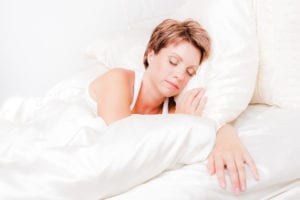Written by Joyce Smith, BS. This study suggests that insufficient sleep increases anxiety levels while deep sleep helps to reduces stress.
 Sleep deprivation is a recognized symptom of anxiety disorders 1 and has been linked to post-traumatic stress disorder (PTSD), generalized anxiety disorder, panic disorder and social anxiety disorder 1,2. While this association between sleep loss and anxiety is well documented, a team of researchers from the University of California-Berkley sought to determine how and why sleep amplifies anxiety in humans; whether specific features of sleep prevent the escalation of anxiety associated with insufficient sleep; and whether repeated nightly sleep deficits trigger day to day increases in society 3. Eighteen healthy participants took part in an in-laboratory experimental study followed by an online longitudinal study involving a small subsample of the general population (n = 194). A second series of confirmation studies were subsequently conducted to replicate and extend key findings. Thirty-two healthy subjects participated in an in-laboratory overnight sleep study to replicate previous findings and a final small subsample of the general population (n = 154) participated in a second small online longitudinal study which tracked habitual sleep and subjective anxiety across a longer duration (four consecutive nights/days) to replicate and further define the sleep–anxiety association.
Sleep deprivation is a recognized symptom of anxiety disorders 1 and has been linked to post-traumatic stress disorder (PTSD), generalized anxiety disorder, panic disorder and social anxiety disorder 1,2. While this association between sleep loss and anxiety is well documented, a team of researchers from the University of California-Berkley sought to determine how and why sleep amplifies anxiety in humans; whether specific features of sleep prevent the escalation of anxiety associated with insufficient sleep; and whether repeated nightly sleep deficits trigger day to day increases in society 3. Eighteen healthy participants took part in an in-laboratory experimental study followed by an online longitudinal study involving a small subsample of the general population (n = 194). A second series of confirmation studies were subsequently conducted to replicate and extend key findings. Thirty-two healthy subjects participated in an in-laboratory overnight sleep study to replicate previous findings and a final small subsample of the general population (n = 154) participated in a second small online longitudinal study which tracked habitual sleep and subjective anxiety across a longer duration (four consecutive nights/days) to replicate and further define the sleep–anxiety association.
Using functional MRI and polysomnography (measures brain waves), along with other measures, Simon and colleagues scanned the brains of 18 healthy young adults as they viewed emotionally stirring video clips after a full night of sleep and again after a sleepless night. Anxiety levels of participants were similar in the evening of each session (P=0.6) yet were significantly greater following disrupted sleep relative to restorative sleep (P=0.009). Overnight changes in anxiety levels revealed a 30% increase in anxiety following disrupted sleep, yet no change following the restorative sleep (P = 0.008). However, after the night of sleep-deprivation, brain scans showed a shutdown of the medial prefrontal cortex, which normally helps keep anxiety in check, while the brain’s deeper emotional centers were overactive. After a full night of restorative sleep, sonographys revealed an even greater decline in anxiety levels for those who experienced more slow-wave NREM (the deepest level of non-rapid eye movement) sleep. It appeared that disrupted sleep had induced anxiety while deep sleep had restored the brain’s prefrontal mechanism that regulates our emotions, thus lowering emotional and physiological reactivity and preventing the escalation of anxiety.
In addition to exploring the sleep-anxiety connection in the 18 original study participants, the researchers replicated the results in an additional study of 30 participants. Across all the participants, the results once again showed that those who had more nighttime restorative deep sleep experienced the lowest levels of anxiety the following day. Researchers then pursued the two online longitudinal studies to test the hypothesis that even modest night to night variations in sleep are associated with changes in anxiety levels. The two small online surveys tracked how both sleep and anxiety levels of participants changed over a short time frame and then after four consecutive days. It was evident that sleep quality and the amount of nightly sleep predicted the level of anxiety experienced the following day. Even subtle nightly changes in sleep affected anxiety levels.
Researchers found that the type of sleep most likely to calm and reset the anxious brain is deep sleep or slow-wave NREM sleep, a state in which neural oscillations become highly synchronized, and heart rates and blood pressure drop. Deep sleep decreases anxiety overnight by reorganizing connections in the brain, and seems to be a natural anxiolytic or anxiety inhibitor providing we get it each and every night. In fact, restorative sleep may be a natural, non-pharmaceutical prophylactic and an effective intervention for those suffering from anxiety.
Source: Simon, Eti Ben, Aubrey Rossi, Allison G. Harvey, and Matthew P. Walker. “Overanxious and underslept.” Nature Human Behaviour (2019): 1-11.
© The Author(s), under exclusive license to Springer Nature Limited 2019
Posted January 21, 2020.
Joyce Smith, BS, is a degreed laboratory technologist. She received her bachelor of arts with a major in Chemistry and a minor in Biology from the University of Saskatchewan and her internship through the University of Saskatchewan College of Medicine and the Royal University Hospital in Saskatoon, Saskatchewan. She currently resides in Bloomingdale, IL.
References:
- Papadimitriou GN, Linkowski P. Sleep disturbance in anxiety disorders. International review of psychiatry. 2005;17(4):229-236.
- Mellman TA. Sleep and anxiety disorders. Sleep Medicine Clinics. 2008;3(2):261-268.
- Simon EB, Rossi A, Harvey AG, Walker MP. Overanxious and underslept. Nature Human Behaviour. 2019:1-11.
